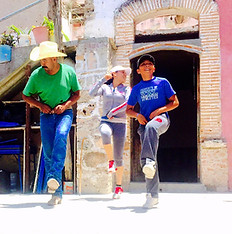
THE NEED
Global Teachers - India 2013
The world is changing at a rapid pace. We have to be bold, move quickly, and ensure sustainability to meet evolving changes and challenges.
North Carolina’s Global Connections
North Carolina is more diverse than ever - one out of every 13 North Carolinians is foreign born. We are just as likely to work, study, and partner with colleagues from Mexico, China, or Vietnam as we are from Hickory, Hatteras, or Greensboro.
In 2018, Foreign Direct Investment in North Carolina surpassed $2.18 billion, contributing more than 250,000 jobs. North Carolina had more than $34 billion in exports in 2019.
Although North Carolina is already global, we need to cultivate residents who understand how to take advantage of global opportunities. The Global Teachers Fellowship maximizes equitable student learning by providing teachers from every county a first-hand experience to learn from best practices across the world and help their students find their place in the global economy.

Global Teachers - Mexico 2019
Remaining Globally Competitive
Learning to navigate a changing world is essential to our progress. It is imperative to pursue global opportunities with strategy and intent in order to succeed in a competitive global marketplace. If North Carolina is to stay competitive, we need to look at what other countries and states are doing to maintain their edge:
-
In many other countries, there is no such thing as “global education.” Education IS global. The Organization for Economic Cooperation and Development (OECD) coordinates a global academic survey, the Program for International Student Assessment (PISA), which measures student achievement in various subjects. It is the test by which countries around the world measure and compare their students’ educational achievement. In 2018, PISA added “global competence” to its triennial assessments of student achievement, signifying that the need for global competence has become universal.
-
Globalization equals jobs. Many businesses take advantage of a global supply chain that allows them to produce around the clock. This means that team members may be down the hall or in another time zone. Our schools must prepare culturally competent students that can compete in a global economy.
-
Many problems cannot be solved by one nation alone; they are global in scope and require global solutions. In 1998, the Asia Society in New York and The Longview Foundation in Washington, D.C. launched a national effort to raise awareness of the need for global education, to help states develop policies, and to create a national network of leaders in the field. North Carolina was an early national leader. Go Global NC led this two-year process of coalition building and in 2005 generated a policy report to increase global education in North Carolina schools.
-
North Carolina is a nationally recognized leader in the K-12 global education field, translating global education ideals into concrete policies that target teacher and student learning. In 2015, the N.C. State Board of Education’s Task Force on Global Education released a policy report with a statewide infrastructure to recognize teachers, schools, and districts that meet global designations. To date, North Carolina is the only state in the nation with a comprehensive global education policy and criteria for teachers, schools, and districts.
-
Research has shown the single greatest determinant of a student’s growth is their teacher, and the most effective professional development for teachers is experiential learning. Policy leaders, education practitioners, academics in higher education, and business leaders alike have done much to build this globally-oriented mindset in North Carolina schools, but we can do more through the Global Teachers Fellowship by providing North Carolina teachers with experiential learning opportunities.
Meeting the Need: the Global Teachers Fellowship

In our experience, only a small percentage of North Carolina’s 95,000 full-time teachers have ever been abroad. For some, the program is their first trip on an airplane. For others, it is their first trip outside of North Carolina.
Far too commonly, teachers may think going abroad to be out of reach, distant, or unattainable. They are not likely to associate their profession with international opportunities. The Global Teachers Fellowship provides global professional development and produces lasting impacts, beyond the teachers to their students and communities.
100% of Global Teachers Fellows receive financial awards to study abroad. When a teacher from every county studies abroad, global education becomes more visible for other North Carolina teachers and their students, including in rural counties where these connections are often less apparent. The annual opportunity for a teacher in each county to participate in the Fellowship increases global engagement and makes the realities of the global economy and global citizenship more accessible and attainable. Over time, school districts gain a critical mass of globally experienced teachers who have studied in different countries. The Global Teachers will have the skills, knowledge, competence, and confidence to help implement strategies toward meeting the global criteria the Department of Public Instruction sets for schools.
Fellowship recipients are encouraged to earn the Department of Public Instruction’s Global Educator Digital Badge. Through their participation in the Global Teachers program, Fellows will earn approximately 80 of the 100 required hours as well as meet the requirement for a “Capstone Project” to earn the digital badge.
Past Global Teachers Program Locations




